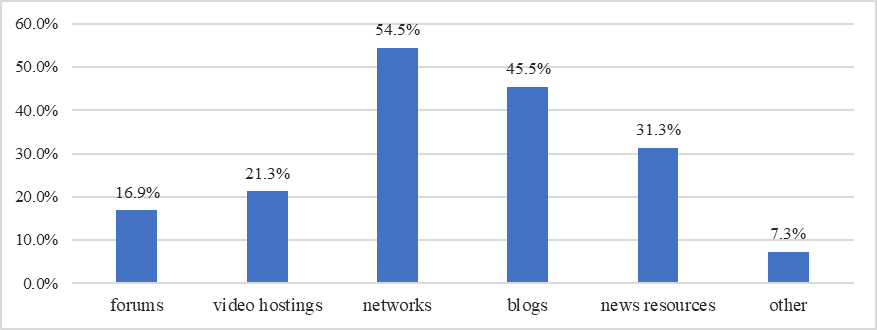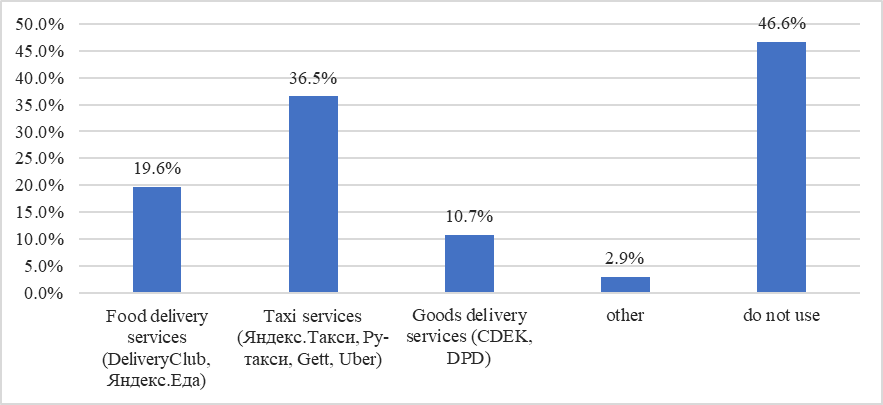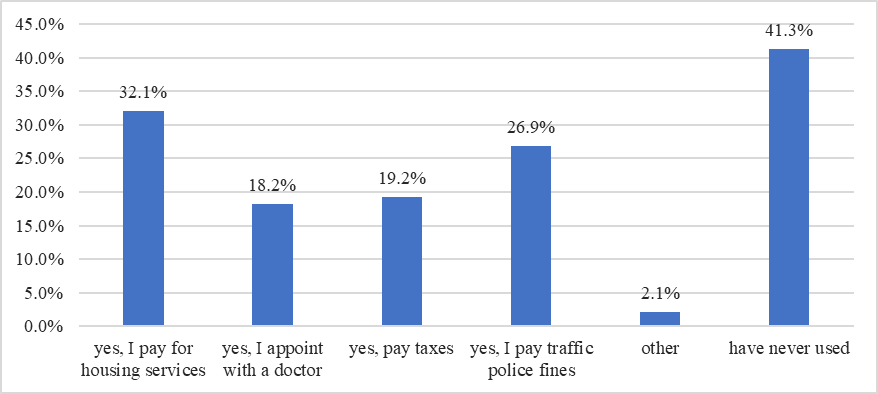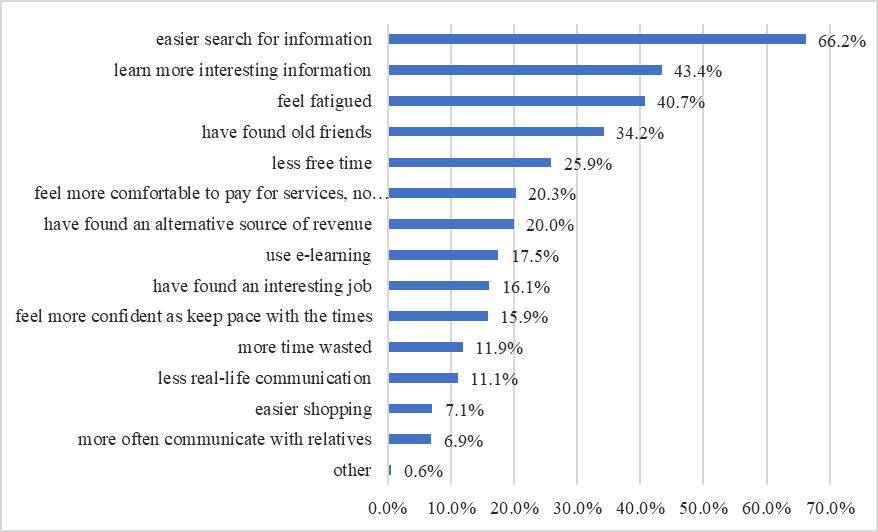Abstract
The current digital transformation needs a universal digital literacy among population enabling to establish the foundations for the ecosystem of the digital economy, prepare citizens to face up to new challenges and ensure information security. Under these circumstances, advanced digital skills are a key prerequisite for living in the digital environment while increasing the efficiency, make people’s life more comfortable and open new opportunities for personal and professional development. However, the opportunities created by the digital economy and the transition to a new industrial and productional model are exacerbating the digital divide between different social and geographical groups of population. The paper deals with the theoretical foundations of digital literacy, analyzes the methodological approaches to its estimation and summarizes the practical aspects of its development based upon the results of the student scientific expedition to the Bezenchuksky municipal raion of the Samara Region (Russia) in 2019. The expedition was aimed at the research into the development of digital economy ecosystem in the rural municipal raion and the level of ICT and digital technologies used by its citizens. The analysis and assessment are based upon the data collected through the sociological research (questionnaire) “Digital competencies of people in the Bezenchuksky municipal raion” which was held during the expedition.
Keywords: Digital literacydigital economydigital competencesdigital dividemunicipal raion
Introduction
Under the context of new industrial revolution and in the emerging digital economy, the general and accelerating dissemination of information results in the emergence of new realities in the organization of work and education caused by digitalization: the changes in career cards and labour markets, growing demand for scarce digital skills, etc. As a result, scholars, businessmen, government officials and citizens are increasingly realizing the need for the skills in the use of modern technologies and the social interaction on their basis. In this regard, the emerging digital economy needs a universal digital literacy among population enabling to establish the foundations for the ecosystem of the digital economy, prepare citizens to face up to new challenges and ensure information security.
Problem Statement
In Russia, the problem of a universal digital literacy among population is becoming a challenge at the national level whose importance is matched by the universal elimination of illiteracy at the beginning of the last century. The strategic approach to solving the problem of a digital divide among population was launched in the National Program “Digital Economy” which has been criticized for being too much focused on technologies while social problems are not adequately emphasized in this strategic document (Yudina, 2018). However, accompanied by the roadmap “Training and Education”, it considers some of the current trends of the digital economy, the need to encourage the development of digital skills and the aid to assist the population in adapting to the fundamental changes in all life spheres caused by digitalization.
The current trends of digitalization are accompanied by the development of a new infrastructure of a digital ecosystem designed to reduce the first level of digital divide (an unequal access to technologies). And when the infrastructural part of the digital divide is gradually being eliminated (as Internet penetration rate at households is more than 70 % even in rural areas (Roscongress, 2018)) the issue of using current digital technologies has become increasingly relevant in Russia where the second level of digital divide connected with the differences between people in digital proficiency is still significant (Chirkunova, Khmeleva, Koroleva, & Kurnikova, 2020). This is due to personal factors such as age, education level, income and locational determinants (the level of socio-economic development of the region concerned, urbanization). Insufficient skills of better use of digital technologies – citizens’ digital skills – hinder the expected impacts of digitalization and the emerging digital economy.
Research Questions
The need to involve Russian citizens into the increased use of ICT and their access to digital dividends raises the importance of methodological approaches to estimating the degree of digital penetration and digital proficiency. Also worthy of emphasis in this connection is the fact that there has been worked out a number of methodologies enabling to measure citizens’ digital skills across countries (ICT Development Index (the International Telecommunication Union - ITU), National Digital Economy Development Index (Rosatom State Corporation)); Russian subjects (Digital literacy index (Regional Social Centre for Internet Technologies – RSCIT)); cities (The digital life of Russian megapolises (SCOLCOVO), The digitalization in Russian smaller cities and towns (HSE and Yandex Taxi)). However, there are no researches into the measurement and analysis of digital literacy among people of poorly urbanized rural areas. In order to fill in this gap, the student scientific expedition “The level of development and use of ICT and digital technologies in the Bezenchuksky municipal raion of the Samara Region (Russia) was launched by the Samara State University of Economics in the summer of 2019. This paper is aimed at summarizing the main scientific results obtained during the expedition where the authors of the paper have participated, too.
As the research is aimed at the study of the emerging eco-system of the digital economy in a rural municipal area and the estimation of the proficiency of its citizens in the use of ICT and digital technologies, it seems necessary to sum up the basic concepts of digital literacy given in modern scientific works.
Digital literacy was defined as an ability to understand and use the information distributed via computers in various formats and from various sources in the monograph by Gilster (1997) in 1997 when the Internet was brand-spanking new. After a decade, due to the widespread ICT circulation, M. Fieldhouse and Nicholas (2008) suggested the terms “literacy” and “fluency” to describe users’ skills in searching for and critically evaluating the information in the digital space (Fieldhouse & Nicholas, 2008). Currently, most scientists define digital literacy as a set of basic skills of producing and consuming digital media, information search and procession, interacting in social networks aiming at creating and distributing knowledge and a number of professional computer skills (Prieto-Nanez, 2016; Capstick, 2016; Steelman, Tislar, Ureel, & Wallace, 2016; Kamoun-Chouk, 2019).
Digital literacy is a cluster of related but not synonymous concepts denoting various knowledge and skills in the domain of using digital devices, apps and networks for accessing information and managing it. Thus, ICT-literacy means a number of user skills of social interaction in the information society. Technological (computer) literacy implies a deeper understanding of the essence of digital technologies and covers both user and technical skills of working with computers. Information literacy emphasizes the skills to find, understand, arrange and archive digitized information. Multimedia literacy involves the skills to create materials with the use of digital resources (text, graphic, audio and video).
Digital literacy is based upon digital competencies – the ability to solve various tasks in the domain of ICT use: create the content using digital technologies, including information search and exchange, answers to questions, interaction with other people and computer programming (Medlock, Spires, & Kerkhoff, 2017). In its definition of digital competence prepared within the Digital Education Action Plan, the European Commission emphasizes the importance of deliberate and responsible use of digital technologies in education, at workplace and in social life (European Commission, 2018). Digital competence should involve the ability to digital collaboration, security and problem solving.
Digital literacy includes personal, technical and intellectual (digital) skills necessary to live in a digital world. Digital skills are established and blindfolded behaviours based upon knowledge and skills in the domain of using digital devices, apps and networks for accessing information and managing it (Medlock et al., 2017). Digital skills enable people to create and exchange digital content, communicate and solve problems for efficient and creative self-realization in education, work and social activities in general. According to Kaeophanuek, Na-Songkhla and Nilsook (2018), digital skills can be divided into three basic categories:
1) Information skills: the fundamental concepts of information management and the techniques and methods related to information management. This category is comprised of problem definition, issue searches, the methods and strategies for accessing analysis, synthesis, content systematisation, evaluation, interpretation and information application for solving problems or working properly;
2) Digital tools usage: the skills and competencies required to learn and use various software applications, digital tools usage for daily life convenience and meeting goals, an ability to manage and solve basic computer problems, communication skills, an ability to manage personal information on networks and the application of technology for co-working and ethics. Digital literacy requires the technical ability to operate digital devices, as well as a variety of cognitive skills to execute tasks in digital environments;
3) Digital transformation: the consolidation of information using evaluation skills with the aim of generating, improving, designing, producing and presenting new forms of information, creating new knowledge, creatively producing digital innovation by co-learning, reflecting on what could be improved and publishing work while understanding internet information copyright law.
Thus, well-developed digital skills a key prerequisite for living in the digital environment while increasing the efficiency, make people’s life more comfortable and open new opportunities for personal and professional development.
Purpose of the Study
The purpose of the paper is to summarize the results of the student scientific expedition into the Bezenchuksky municipal raion of the Samara Region. The expedition was aimed at researching into the development of digital economy ecosystem in the rural municipal raion. One of its goals was to evaluate the level of ICT and digital technologies used by its citizens.
Research Methods
The above-mentioned purpose of the study was achieved by the sociological study conducted in the Bezenchuksky municipal raion of the Samara Region (Russia). The main method of sociological survey was unrestricted random sample enabling high level of representativeness. The sociological survey in the Bezenchuksky municipal raion of the Samara Region was conducted in June, 2019 by sampled questioning of 521 respondents aged 12 to 89, among them 271 women (52 %) and 232 men (44.5 %). The average age of respondents was 40. The respondents differed greatly in their education levels: 4 people (0.8 %) were at primary level, 32 (6,1 %) – lower secondary, 41 (7,9 %) – upper secondary, 15 (2,9 %) – initial vocational training, 169 (32,4 %) – secondary vocational, 66 (12,7 %) – uncompleted higher, 172 (33,0 %) – higher education, 17 (3,3 %) – had several degrees of higher education or an academic degree. Mostly medium-income citizens (47 %) took part in the survey. Social and demographic portrait of respondents speaks for the balanced sampling. We used simple and complex grouping while processing the results. The method enabled to carry out an in-depth study of digital skills among the population of the Bezenchuksky municipal raion of the Samara Region. SPSS Statistics was used to process the questionnaires and conduct the research.
Findings
According to our views of the digital literacy structure presented in the studies by Kurnikova and Chirkunova (2019), Kurnikova and Koroleva (2019), we developed and arranged the questions in order to estimate the digital skills among rural population across two basic components:
1) Basic functional skills necessary to access and start working with digital technologies;
2) Standard digital skills needed for conscious and efficient use of online-apps and services involving the skill to evaluate the sources and relevance of data, store and arrange information, the skill to protect devices and received information from viruses and internet attacks.
However, the questionnaire had some questions aimed at the change of living realities in connection with the ubiquitous penetration of the internet here referred to as ‘digital transformation’. Further, we consider the obtained results according to the three components.
Basic functional skills
The level of Internet use intensity was measured through the questions “How often do you address to the Internet?” and “How much time a day do you spend in the Internet?”. The analysis of the replies given to the first question revealed that 64.1 % of respondents address to the Internet several times a day, 15.7 % – several times a week, 4.4 % - several times a month and 78 persons (15 %) do not use the Internet at all. Out of Internet-users, 28.2 % spend with it up to 1 hour a day, 29.7 % – 1-2 hours, 24.7 % – 3-5 hours, 17.2 % – over 5 hours a day. 74.1 % of respondents have the Internet access in their mobile phone /smartphone.
As basic functional skills imply the skills to work with devices, access the Internet, create an account, find information or a necessary resource in the Internet, as well as motor skills (the skill to type) and gestures (to work with sensor screens), we attempted to measure them by the use of social networks. It turned out that the most popular of them were the networks for socializing (Facebook, VK, OK) – they were chosen by 97.6 % of those who used social networks. 34.7 % used the networks for media content exchange (YouTube, Instagram, SnapChat). The rest were used by only few people: Rate&Goods, Mysku were chosen by 11.7 % of respondents, 4pda, Forumhouse, iXBT – by 4.2 %, Myspace – by 1.3 %, LendWings, Uniweb – by 3.5 %.
As basic functional skills largely depend on the physical access of population to digital technologies measured by audience outreach, we tried to find out the most popular Internet access types in our survey. We found out that 60.8 % of respondents use mobile phone with Internet access, 45.3 % – fixed Internet on their computers, 24.2 % of people prefer publicly available Wi-Fi networks (in cafes, shops, public institutions, etc.) and 12.1 % use mobile access via USB modem.
In the questionnaire, we asked respondents to note the most preferable ways of communication in everyday life (they were offered to ‘tick’ three options out of seven or suggest their own one). Thus, 49.7 % of respondents communicate via social networks, 18.8 % – via e-mail, 35.5 % – via programs for instant messaging (Viber, What’sUp); 44.7 % of respondents prefer phone, 9.2 % – video-conferencing, 2.1 % – IP-telephony, 37.4 % still communicate in person. Thus, the survey revealed a high degree of basic skills associated with the transfer of rural population from “non-users” into the users of modern digital technologies.
Basic digital skills
In order to estimate the proficiency of population in basic digital skills, we asked respondents to note the Internet and digital services they use. The results of the survey are presented in Figure

Source: authors.
The results also showed show that 41.8 % of people do not shop online, 24.2 % do it rarely, 18.0 % – only sometimes, and only 8.4 % always buy things, games, services or content online.

Source: authors.
Most respondent (55.3 %) are not aware of e-government, rural population rarely receives digital public services and makes financial transactions through the internet (see Figure

Source: authors.
One of the survey parts was devoted to cybersecurity where we asked respondents to assess the Internet threats. It turned out that 21.9 % of respondents find the Internet threats very dangerous, 20.6 %- rather exaggerated, 17.9 % – unlikely while 38.1 % had no opinion on it. Further we asked them on the protection of their personal data in the Internet. 53.5 % of respondents use a simple password, 17.0 % create complicated passwords of digits, letters and symbols, 7.8 % use 256-bit encryption and 19.8 % do not use any passwords at all. At the same time, 9.1 % of people have faced Internet fraud and suffered from it; 16.9 % highly assess their vigilance and are able to recognize Internet swindlers; 16.5 % have heard of it from friends, acquaintances, relatives; 21.7 % know of the problem and more than one third (35.3 %) of respondents do not know about this threat. Thus, the survey revealed the proficiency levels in the efficient use of online-apps and services: messengers, financial services, social networks, public services portals, etc. The results can be used while working out regional and municipal programs and projects of “digital education”.
Digital transformation
We asked respondents to evaluate how digitalization has affected their life quality. The analysis of their replies is presented in Figure

Source: authors.
Thus, this part of the survey enabled to obtain the results showing the changes in village life influenced by the emerging digital economy as a new reality.
Conclusion
Therefore, the research enabled to analyze and evaluate the degree of digital competences among the rural population of the Bezenchuksky municipal raion of the Samara Region (Russia) according to the components; basic functional skills, standard digital skills and the skills to adapt to the digital transformation. The importance of the results is in their further use in an in-depth analysis of digital literacy among rural population depending on their age, education level or living standards and in the scientific justification and development of instruments and methods aimed at increasing digital literacy among population of the municipal raions of the Samara Region within the new federal project “Digital Region”.
Acknowledgments
The authors of the paper express their gratitude to the Administration of the Bezenchuksky raion of the Samara region for the facilitation in the organization and conducting researches across its territory.
References
- Capstick, T. (2016). Digital literacies. In T. Capstick (Ed.), Multilingual Literacies, Identities and Ideologies (pp.173-207). London: Palgrave Macmillan.
- Chirkunova, E. K., Khmeleva, G. A., Koroleva, E. N., & Kurnikova, M. V. (2020). Regional digital maturity: Design and strategies. In S. I. Ashmarina, M. Vochozka, V. V. Mantulenko (Eds.), Digital Age: Chances, Challenges and Future. Lecture Notes in Networks and Systems, 84 (pp. 205-213). Cham: Springer.
- European Commission (2018). Digital education action plan. Retrieved from https://ec.europa.eu/education/education-in-the-eu/digital-education-action-plan_en Accessed: 11.10.2019.
- Fieldhouse, M., & Nicholas, N. (2008). Digital literacy as information Savvy: The road to information literacy. In M. Knobel, C. Lankshear (Eds.), Digital Literacies Concepts, Policies and Practices (pp. 43–72). New York, NY: Peter Lang Publishing.
- Gilster, P. (1997). Digital literacy. New York: Wiley.
- Kaeophanuek, S., Na-Songkhla, J., & Nilsook, P. (2018). How to enhance digital literacy skills among information sciences students. International Journal of Information and Education Technology, 8(4), 292-297.
- Kamoun-Chouk, S. (2019). Study of entrepreneurial students’ perceptions of the impact of digital literacy skills on their future career: Evidence from Tunisian higher education. In L. Uden, I. H. Ting, J. Corchado (Eds.), Knowledge Management in Organizations. Communications in Computer and Information Science, 1027 (pp. 392-402). Cham: Springer.
- Kurnikova, M. V., & Chirkunova, E. K. (2019). Digital literacy: Theoretical foundations and assessment methodology. In S.I. Ashmarina (Ed.), Problems of Enterprise Development: Theory and Practice (pp. 70-77). Samara: Samara State University of Economics.
- Kurnikova, M. V., & Koroleva, E. N. (2019). Analysis and assessment of digital competences of people in a rural municipal area. In S. I. Ashmarina (Ed.), Problems of Enterprise Development: Theory and Practice (pp. 65-70). Samara: Samara State University of Economics.
- Medlock, Р., Spires, H., & Kerkhoff, S. (2017). Digital literacy for the 21st century. IGI Global. Retrieved from https://www.igi-global.com/chapter/digital-literacy-for-the-21st-century/215909 Accessed: 25.11.2019.
- National Program “Digital Economy of the Russian Federation”. Retrieved from http://static.government.ru/media/files/urKHm0gTPPnzJlaKw3M5cNLo6gczMkPF.pdf Accessed: 01.10.2019.
- Prieto-Nanez, F. M. (2016). Learning through infrastructures: Cybercafes as spaces for digital literacy. In M.A. Peters (Ed.), Encyclopedia of Educational Philosophy and Theory (pp. 1-5). Singapore: Springer.
- Roscongress (2018). The digitalization in Russian smaller cities and towns. Retrieved from https://roscongress.org/materials/tsifrovizatsiya-v-malykh-i-srednikh-gorodakh-rossii/ Accessed: 11.10.2019.
- Steelman, K. S., Tislar, K. L., Ureel, L. C., & Wallace, C. (2016). Breaking digital barriers: A social-cognitive approach to improving digital literacy in older adults. In C. Stephanidis (Ed.), HCI International 2016 – Posters' Extended Abstracts. Communications in Computer and Information Science, 617 (pp. 445-450). Cham: Springer.
- Yudina, M. A. (2018). Social prospects of the digital economy of the Russian Federation 2017–2030 project. Population Life Level Regions of Russia. https://doi.org/10.24411/1999-9836-2018-10007
Copyright information

This work is licensed under a Creative Commons Attribution-NonCommercial-NoDerivatives 4.0 International License.
About this article
Publication Date
01 April 2020
Article Doi
eBook ISBN
978-1-80296-081-5
Publisher
European Publisher
Volume
82
Print ISBN (optional)
-
Edition Number
1st Edition
Pages
1-1004
Subjects
Business, innovation, management, management techniques, development studies
Cite this article as:
Kurnikova, M., Koroleva, E., & Chirkunova, E. (2020). Digital Competences Of Rural Population: Theory, Estimation Methodology And Research Experience. In V. V. Mantulenko (Ed.), Problems of Enterprise Development: Theory and Practice, vol 82. European Proceedings of Social and Behavioural Sciences (pp. 545-553). European Publisher. https://doi.org/10.15405/epsbs.2020.04.70
